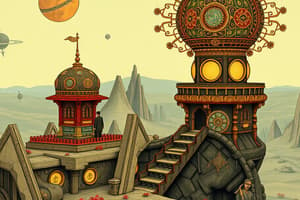Podcast
Questions and Answers
Which historic work is credited with introducing concepts like space travel and interplanetary conflict?
Which historic work is credited with introducing concepts like space travel and interplanetary conflict?
- Around the World in Eighty Days by Jules Verne
- Frankenstein by Mary Shelley
- Gulliver’s Travels by Jonathan Swift (correct)
- War of the Worlds by H.G. Wells
Who wrote the novel that explored scientific themes such as life creation via artificial means?
Who wrote the novel that explored scientific themes such as life creation via artificial means?
- Mary Shelley (correct)
- Karel Čapek
- H.G. Wells
- Jules Verne
Which early writer popularized the science fiction genre with novels like 'Around the World in Eighty Days'?
Which early writer popularized the science fiction genre with novels like 'Around the World in Eighty Days'?
- Jules Verne (correct)
- Jonathan Swift
- H.G. Wells
- Karel Čapek
What term was coined by Karel Čapek in his work 'R.U.R.'?
What term was coined by Karel Čapek in his work 'R.U.R.'?
Which of the following is a recurring theme in science fiction literature?
Which of the following is a recurring theme in science fiction literature?
What aspect of human existence does science fiction literature often grapple with?
What aspect of human existence does science fiction literature often grapple with?
Which author wrote the complex epic 'Dune' set on the desert planet Arrakis?
Which author wrote the complex epic 'Dune' set on the desert planet Arrakis?
Which author's work 'Do Androids Dream of Electric Sheep?' was adapted into the film 'Blade Runner'?
Which author's work 'Do Androids Dream of Electric Sheep?' was adapted into the film 'Blade Runner'?
Which author explored dystopian futures and environmental catastrophe in the work 'Parable of the Sower'?
Which author explored dystopian futures and environmental catastrophe in the work 'Parable of the Sower'?
Which television show delves into humorous yet troubling implications of modern technologies?
Which television show delves into humorous yet troubling implications of modern technologies?
In which film is there a thoughtful extraterrestrial encounter plotline deeply engaging with linguistics and relativity theory?
In which film is there a thoughtful extraterrestrial encounter plotline deeply engaging with linguistics and relativity theory?
What has allowed science fiction to expand beyond traditional literary forms in recent years?
What has allowed science fiction to expand beyond traditional literary forms in recent years?
Flashcards are hidden until you start studying
Study Notes
Science Fiction: Exploring New Worlds through Literature
Science fiction is more than spaceships and aliens; it's a genre that pushes boundaries of creativity and imagination while also grappling with fundamental questions related to human existence. Here we delve into the world of science fiction literature to understand its origins, key themes, and enduring impact.
Origins and Early Influences
The roots of science fiction can be traced back to two historic works: Gulliver’s Travels by Jonathan Swift, published in 1726, which introduced futuristic concepts like space travel and interplanetary conflict, and Mary Shelley's Frankenstein, written in 1818, which explored scientific themes such as life creation via artificial means. During the late 19th century, Jules Verne further popularized the genre with novels like Around the World in Eighty Days and Twenty Thousand Leagues Under the Sea. Other prominent early writers included H. G. Wells (War of the Worlds) and Karel Čapek (R.U.R.), who coined the term 'robot.'
Key Themes
At its core, science fiction examines societal issues, technological advancements, and philosophical conundrums through fictional settings, often located far outside our everyday reality. Some recurring themes include the nature of consciousness, the representation of alien races, the possibility of time travel, posthumanism, ecological concerns, and the effects of technology on society. These ideas have been tackled across countless stories, short tales, novellas, and novels over the decades.
Notable Authors and Works
From Isaac Asimov's Foundation series to Ursula K. Le Guin's Earthsea cycle, numerous authors have contributed significantly to shaping science fiction's course throughout history. A brief list includes:
- Frank Herbert – Dune, a complex epic set upon desert planet Arrakis
- Philip K. Dick – Do Androids Dream of Electric Sheep?, later adapted into Ridley Scott's film Blade Runner
- Octavia Butler – Parable of the Sower, exploring dystopian futures and environmental catastrophe
These writers offer diverse perspectives and unique takes on familiar subjects, challenging readers to question their own assumptions regarding humanity, progress, and the future.
Modern Trends
In recent years, science fiction has expanded beyond traditional literary forms to include graphic novels, interactive storytelling platforms, and audiovisual media. Innovations in these fields have allowed creators to explore new narrative depths and push the envelope even further. For example, the television show Black Mirror explores humorous yet troubling implications concerning modern technologies, evoking discussions among viewers globally. Similarly, films like Arrival engage deeply with linguistics and relativity theory within a thoughtful extraterrestrial encounter plotline.
Conclusion
As you continue your journey through the landscape of science fiction literature, remember this evergreen genre offers limitless opportunities to discover intriguing worlds, unconventional perspectives, and profound truths. Each text invites us to reflect on our shared existence and ponder the many paths our collective fate might take. So, strap yourself in, fasten your seatbelts—the cosmos awaits!
Studying That Suits You
Use AI to generate personalized quizzes and flashcards to suit your learning preferences.



